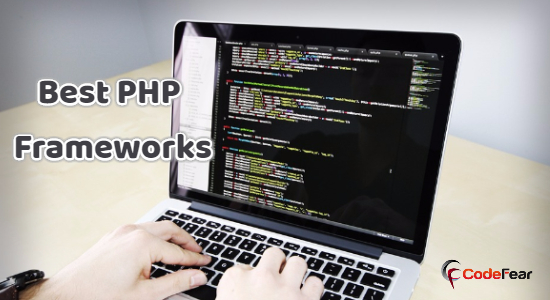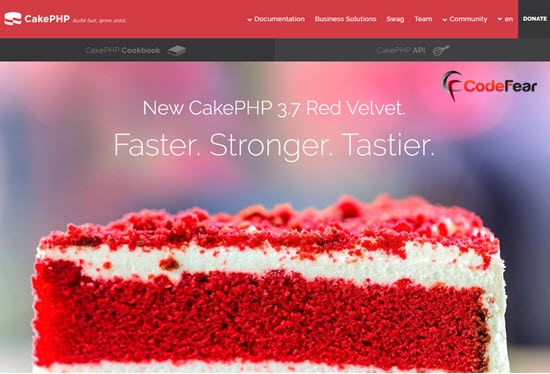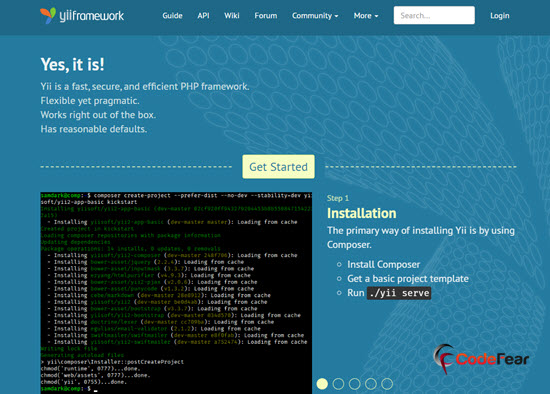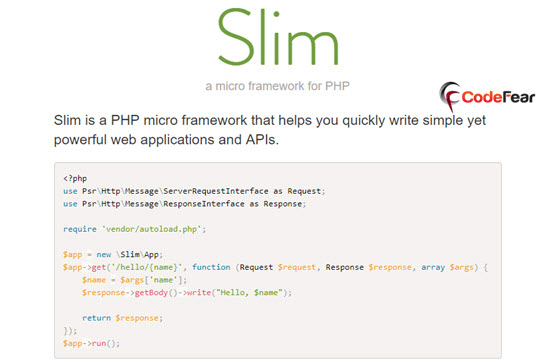PHP (Hypertext Preprocessor) is known to be an extremely popular open-source server-side scripting language. It’s one of the best programming languages for developing websites and applications.
In fact, PHP holds a large chunk of the market with almost 80% of all websites using PHP as of October 2018.
So, if you are looking for the Best PHP Framework to develop PHP based web app, then this post will help you choose the best PHP Framework.
The post aims to help you choose the right PHP framework. Here, we have featured Ten Popular and Best PHP Frameworks.
PHP Frameworks are very popular with developers as it simplifies the development process. It includes all the functionality you’ll need to develop a new PHP application.
Developers use PHP Frameworks for building complex websites and web apps. By using PHP Frameworks, they can save a lot of time and hassle.
PHP Framework offers a structured natural way for building websites and apps. So, it streamlines and speeds up the process of backend web development.

Here, we have provided a short snapshot of what PHP Frameworks do:
PHP Frameworks are available in all sorts of shapes and sizes and fulfill the needs of developers having different levels of experience, application needs, development time-frames, and hosting capabilities.
Each PHP framework comes with its strengths and weaknesses. They vary in terms of community, documentation, as well as the database they support.
So, when you want to select the PHP Framework, you need to consider factors such as security, ease of use, scalability, documentation, and more.
In short, you need to understand the requirements of your project or application that you want to develop.
Here, we have listed the top 10 PHP Frameworks making it easy for you to select the right one according to your needs. We have detailed out the features (functionality as well as technical specifications) so that you can’t go wrong.
Here, we have introduced several top solutions of PHP Frameworks each offering a unique way for developing web projects and applications.
If you want to keep track of your web apps logs Loggly is a great solution, don’t forget to check Loggly.
So, let’s see the list of popular and best PHP frameworks.
10 Best PHP Frameworks List
Here’s the listing for you:
1. Laravel Best PHP Framework
Laravel is by far the most popular free and open-source PHP framework in the world. It can securely handle complex web applications at a much faster pace than other frameworks out there.
Moreover, Laravel is known for its elegant syntax that is easy to grasp and pleasure to work with. It eases out the development process by simplifying common tasks such as routing, sessions, caching, and authentication.
Laravel allows you to work on your projects rapidly. It offers many useful functions such as user authentication, session management, and caching.
Overall, Laravel offers all the essential functionality that you need to build a modern PHP application. Its core is solid from a performance standpoint. Plus, the framework can be extended using a lot of add-ons.
So, using the Laravel PHP Framework can be a smart idea.
Laravel allows you to build highly-scalable applications. It also integrates with other third-party libraries and platforms, including Amazon Web Services.
Some of its key features include:

2. CodeIgniter Top PHP Framework
CodeIgniter is regarded as one of the most powerful PHP Framework built on the Model View Controller (MVC) architecture. It is easy to install with minimal user configuration. It’s a lightweight framework and is merely 2MB in size, including the documentation.
CodeIgniter is highly suitable for developing dynamic websites. It comes with many built-in libraries for unit testing, form validation, email, sessions, and much more. It offers top-notch error handling, inbuilt security tools, and excellent documentation. CodeIgniter can be used to create scalable apps.
In fact, CodeIgniter is one of the oldest frameworks featured in this list of best PHP frameworks. It was initially released in 2006.
CodeIgniter proves an excellent option if you wish to avoid PHP version conflict. It currently requires only PHP 5.2.4 and works on almost all shared and dedicated hosting platforms. It can be installed simply by uploading it directly to your hosting.
So, CodeIgniter proves one of the best PHP frameworks for rapid application development.
Moreover, CodeIgniter has a small learning curve making it easy for you to build fully fledged web applications. It’s easy to learn and get started with.
Plus, CodeIgniter has extensive documentation, and its community is vast and helpful. It’s even backed by the British Columbia Institute of Technology which ensures its continued development and growth.

3. Symfony Popular PHP Frameworks
The Symfony PHP Framework is a reliable and mature platform. It was launched in 2005. So, it’s the oldest framework on this list. Symfony has held the trust of developers for more than a decade. It follows the standards of PHP and the web completely.
In fact, the components of the Symfony framework are being used by many impressive projects, including the Laravel framework listed above.
Moreover, the Symfony Components has many PHP libraries that allow you to complete different tasks such as form creation, object configuration, routing, templating, authentication, and much more.
Symfony is well known for being one of the most stable, high performance, and well-documented PHP framework. It’s backed by the French SensioLabs.
Many big-name companies such as the BBC make use of Symfony. Plus, many popular CMS such as Drupal, OroCRM, and PhpBB make use of Symfony components.
Symfony is very popular with developers as it offers extensive libraries and components that help in completing a variety of tasks such as templating, object configuration, authentication, and much more. Symfony is a great choice among PHP frameworks as it is perfectly suitable for managing large-scale enterprise assignments.
Plus, Symfony is easy to get started as it offers tons of great online Symfony tutorials. It also has a highly active programming community.

4. CakePHP PHP Framework
CakePHP is one of the most simple and elegant PHP frameworks on this list of best secure PHP framework.
In fact, CakePHP was one of the first PHP (MVC) Frameworks to hit the market. It’s already a decade old. Its first version was released in 2005.
That said CakePHP still holds a prominent place in the PHP Framework list and regarded among the most popular PHP frameworks out there. It has managed to keep up with time.
Its latest version, CakePHP 3.0 offers enhanced session management, improved modularity, and increased ability to create more standalone libraries. Some of the big brands such as BMW, Express, and Hyundai make use of CakePHP for powering their websites.
CakePHP can be used to create web apps that require high-level of security. In fact, CakePHP offers many built-in security features such as input validation, SQL injection prevention, CSRF (cross-site request forgery) protection, XSS (cross-site scripting) prevention, and many others.
CakePHP proves an ideal framework for beginners as it helps to rapidly develop web apps. It offers code generation and scaffolding functionality which help to speed up the development process.
Plus, the package includes tons of other functionalities, as well. Configuration is also easy with CakePHP as it nullifies the requirement of complicated XML or YAML config files.
Moreover, CakePHP makes it easy for you to get started with extensive documentation together with lots of support portals.

5. Yii PHP Frameworks For Developers
The Yii (Yes, it is!) framework is a simple, secure, efficient and evolutionary PHP framework featured in this list of top 10 PHP frameworks.
In fact, Yii is one of the oldest PHP frameworks out there. It has come up with its latest version is known as Yii 2 to garner a much-needed popularity boost.
Yii 2 is based on the DRY concept (Don’t Repeat Yourself). It’s an object-oriented framework and is highly suitable for developing large scale websites. Yii 2 makes use of the lazy loading technique which makes it faster than other frameworks in the mix.
It’s easy to set up and best in performance which is a big selling point. So, it speeds up web application development. It can be integrated with JQuery and AJAX features.
Additionally, Yii comes with a powerful class code generator known as Gii that offers object-oriented programming and rapid prototyping with a web-based interface allowing to interactively generating the code you need.
Other features include:
However, Yii tends to be tough for beginners if it’s your first framework.

6. Zend Framework Free PHP Framework
Zend is a fully object-oriented framework. It’s a robust and stable PHP framework. Zend is more suitable for complex projects rather than smaller projects as it is packed with a lot of configuration options. Its scheduled major release, Zend Framework 3 is optimized for PHP 7. However, it will also support PHP 5.5 onwards.
Zend is built keeping speed, performance, security, and extensibility in mind. Zend is oriented towards enterprise applications. It has a surplus of components for tasks such as forms, services, authentication, and much more. So, Zend makes the life of a developer fairly easy.
The Zend Framework offers features such as easy-to-use drag and drop editor, coding tools, online debugging tools, and a scalable interface useful for building complicated websites. However, Zend is not suitable for beginners as it is one of the most difficult frameworks to learn.
Some of its key features include:
Overall, Zend proves an excellent PHP framework if you have development experience and you like object-oriented coding.

7. Phalcon
Phalcon is one of the fastest frameworks around. It uses the MVC architecture. However, it differs from other PHP frameworks in the sense that it is based on C and C++ coding style.
Phalcon comes loaded with exceptional features such as asset management, translation, universal autoloader, translation, caching, security, and much more. It’s easy to use and very well documented. So, it’s definitely worth a try.
Some of its key features include:

8. Slim
Slim PHP Framework allows you to create simple yet powerful web applications. It’s a lightweight micro framework that is best utilized for developing RESTful APIs and services. It’s inspired by a Ruby microframework known as Sinatra.
So, Slim is excellent for developing small applications which do not need the features of a full-stack framework. With Slim, you can create simple but powerful web applications and APIs.
Slim is easy to learn. Moreover, active maintenance and friendly documentation make Slim a very user-friendly PHP framework. Some of its noteworthy features include URL routing, client-side HTTP caching, session, and cookie encryption. It also supports “flash” messages across HTTP requests.
So, with Slim, you get everything you need and nothing you don’t. Developing with Slim is very easy as it is actively maintained and offers extensive documentation as well.

9. FuelPHP PHP Software
FuelPHP is a modern, highly modular, sophisticated, flexible, and extensible PHP framework. It not only supports the ordinary MVC pattern but even its evolved version, the HMVC (Hierarchical Model-View-Controller) at the architecture level.
It’s relatively a new PHP framework and was first launched in 2014.
FuelPHP fully addresses your security concerns by offering features such as input & URI filtering and output encoding. FuelPHP can deliver end-to-end web solutions of diverse sizes and complexities.
Here, we list out some of its unique aspects:
However, as FuelPHP is relatively new, it offers less support and presents a steeper learning curve.

10. PHPixie PHP Framework
PHPixie was introduced in 2012. It’s similar to FuelPHP in the sense that it implements the HMVC design pattern. PHPixie is a high-performance framework for read-only websites. It’s highly suitable for developing social networking websites, customized web applications, as well as web app development services.
Some of its notable aspects include HMVC architecture, standard ORM (Object Relational Mapping), input validation, caching, authentication, and authorization capabilities.
It’s built using independent components that can be used without the framework itself. Moreover, PHPixie components are 100% unit tested. So, they require minimum dependencies.
Since it is relatively new, PHPixie has a smaller community of users than other PHP frameworks.
Its official website offers a tutorial claiming that you can learn the framework in 30 minutes. Its blog also details many practical use cases. It even allows you to use the HAML markup language. It enables schema migration and offers a sophisticated routing system.
PHPixie is a thoroughly lightweight, modularized and user-friendly PHP framework. However, PHPixie offers relatively few modules and is less popular than some of the other frameworks listed in this post.

Each of the above PHP Frameworks helps you to build basic web apps as well as fully featured web applications. These are the best PHP frameworks for large scale applications. It’s a thoroughly comprehensive PHP framework list.
We have showcased best secure PHP Frameworks out there. We hope that you are now well aware of the top 10 PHP Frameworks.
The post endeavors to make your job easy of selecting the most suitable PHP framework according to your needs. We hope that you found the post useful.
Lastly, we request you to share the post on popular social networking channels, including Facebook, LinkedIn, and Twitter.
We welcome your comments and suggestions. Let us know which PHP framework you are using.